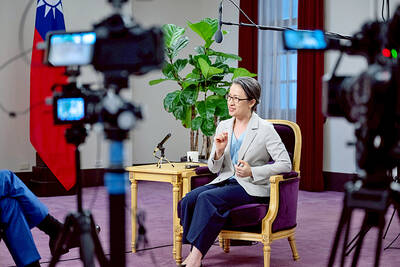Up to 70 percent of parents in a recent survey said they would like the government to create more “English village” language-learning facilities.
“English villages” offer simulated environments such as restaurants and airplane cabins to allow English learners to use the language in a variety of “real-life” situations.
Such villages have been created by some local governments, including Kaohsiung City and County, and organizations like the King Car Education Foundation.
THIRD GRADE
In the Chinese-language Mandarin Daily News survey — conducted last month and this month with 1,394 parents of students at 11 randomly chosen elementary schools nationwide — 88 percent of respondents supported the Ministry of Education’s policy of starting English education in the third grade.
Almost 9 percent of parents opposed creating more “English villages,” the survey found.
About 60 percent of parents said they were concerned about their children’s ability to compete with others in terms of foreign languages, while 90 percent said the ability to compete in the global arena was important for their children’s future.
Close to 70 percent of respondents expressed concern about the difficulty their children might face later in finding employment.
COMPETING
The majority of respondents said character, academic background, confidence and creativity were factors that would affect their children’s ability to compete, while about 17 percent named the ability to cooperate with others.
Most respondents also chose proficiency in foreign languages, professional expertise and the ability to be independent as factors for international competitiveness.
About 11 percent of respondents named knowledge of international etiquette.
About 45 percent said children should begin to acquire the skills they will need to compete later in elementary school. About 21 percent said children should start learning these skills as toddlers.

China might accelerate its strategic actions toward Taiwan, the South China Sea and across the first island chain, after the US officially entered a military conflict with Iran, as Beijing would perceive Washington as incapable of fighting a two-front war, a military expert said yesterday. The US’ ongoing conflict with Iran is not merely an act of retaliation or a “delaying tactic,” but a strategic military campaign aimed at dismantling Tehran’s nuclear capabilities and reshaping the regional order in the Middle East, said National Defense University distinguished adjunct lecturer Holmes Liao (廖宏祥), former McDonnell Douglas Aerospace representative in Taiwan. If

TO BE APPEALED: The environment ministry said coal reduction goals had to be reached within two months, which was against the principle of legitimate expectation The Taipei High Administrative Court on Thursday ruled in favor of the Taichung Environmental Protection Bureau in its administrative litigation against the Ministry of Environment for the rescission of a NT$18 million fine (US$609,570) imposed by the bureau on the Taichung Power Plant in 2019 for alleged excess coal power generation. The bureau in November 2019 revised what it said was a “slip of the pen” in the text of the operating permit granted to the plant — which is run by Taiwan Power Co (Taipower) — in October 2017. The permit originally read: “reduce coal use by 40 percent from Jan.

‘SPEY’ REACTION: Beijing said its Eastern Theater Command ‘organized troops to monitor and guard the entire process’ of a Taiwan Strait transit China sent 74 warplanes toward Taiwan between late Thursday and early yesterday, 61 of which crossed the median line in the Taiwan Strait. It was not clear why so many planes were scrambled, said the Ministry of National Defense, which tabulated the flights. The aircraft were sent in two separate tranches, the ministry said. The Ministry of Foreign Affairs on Thursday “confirmed and welcomed” a transit by the British Royal Navy’s HMS Spey, a River-class offshore patrol vessel, through the Taiwan Strait a day earlier. The ship’s transit “once again [reaffirmed the Strait’s] status as international waters,” the foreign ministry said. “Such transits by

Taiwan is doing everything it can to prevent a military conflict with China, including building up asymmetric defense capabilities and fortifying public resilience, Vice President Hsiao Bi-khim (蕭美琴) said in a recent interview. “Everything we are doing is to prevent a conflict from happening, whether it is 2027 or before that or beyond that,” Hsiao told American podcaster Shawn Ryan of the Shawn Ryan Show. She was referring to a timeline cited by several US military and intelligence officials, who said Chinese President Xi Jinping (習近平) had instructed the Chinese People’s Liberation Army to be ready to take military action against Taiwan